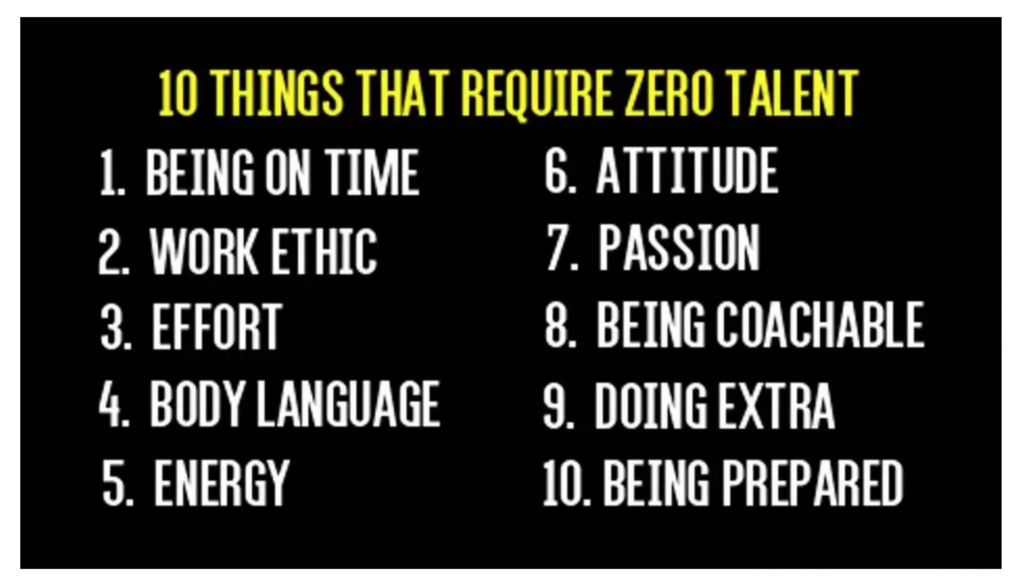The good news: Raw talent is overrated.
Ever feel like success is reserved for the naturally gifted? Maybe you’ve looked at a classmate, a colleague, or even a competitor and thought, “Well, they were just born with it.” The good news? Raw talent is overrated. Success isn’t about winning a genetic lottery—it’s about cultivating qualities that require zero talent but have maximum impact.
10 Qualities That Require Zero Talent
In his must-read article, Nick Alchin debunks the talent myth, explaining how high-achieving students often struggle not because they lack ability, but because they believe talent is everything. He highlights a powerful list: 10 Qualities That Require Zero Talent. These are the real difference-makers:
- Being on Time – Punctuality isn’t a skill; it’s a habit of respect and responsibility.
- Work Ethic – Consistently putting in effort separates the great from the good.
- Effort – Hard work beats talent when talent doesn’t work hard.
- Body Language – Project confidence and engagement, even when unsure.
- Energy – Enthusiasm fuels learning and collaboration.
- Attitude – A growth mindset changes how we approach challenges.
- Passion – Loving what you do leads to mastery and persistence.
- Being Coachable – Willingness to learn and accept feedback accelerates growth.
- Doing Extra– Going beyond the bare minimum builds excellence.
- Being Prepared – Planning and organization create success.
These qualities aren’t about natural ability—they’re about daily choices. The best part? Anyone can develop them. In fact, enduri helps students and teachers integrate these into learning strategies, ensuring that effort, adaptability, and resilience become lifelong habits.
Let’s break down why this list matters and how it can transform learning in schools, at home, and beyond.

Success isn’t about winning a genetic lottery—it’s about cultivating qualities that require zero talent but have maximum impact.
The Hidden Challenge in Competitive Schools
Why endurance and strategies Matter More Than Rankings
In elite academic environments, even high-achieving students often feel like they’re failing. Why? Because they constantly compare themselves to equally talented peers. As Nick Alchin explains, when everyone around you is exceptional, it’s easy to feel like you’re not enough (1).
This is called the Big-Fish-Little-Pond Effect—a well-documented psychological phenomenon (2). It describes what happens when a strong performer (a “big fish”) moves from a small, comfortable environment (a “small pond”) to a larger, more competitive setting (a “big pond”). Suddenly, that student who once stood out now feels average, or even below average, simply because they’re surrounded by equally strong or stronger peers. The paradox? Their actual abilities haven’t changed at all, but their confidence and self-perception might take a hit.
How enduri Helps Shift the Focus From Comparison to Growth
Rather than fostering a ranking-obsessed mindset, learning strategies teach students how to measure success against themselves. Instead of asking “Am I smarter than my classmates?” they learn to ask “Am I improving?” This shift builds confidence, encourages experimentation, and makes learning a rewarding process rather than a high-stakes competition. This is exactly where enduri steps in. The platform encourages students to focus onprogress, effort, and adaptabilityrather than static performance markers.It rewards risk-takers—students who try new strategies, explore different learning techniques, and embrace challenges as opportunities to grow.
Nick Alchin’s Insights on Talent & Peer Pressure
Talent alone isn’t enough!
In his arcticle, Nick Alchin highlights that talent alone isn’t enough (1). Schools that emphasize talent without teaching how to learn create environments where students crumble when they encounter difficulty. Without resilience and structured learning strategies, even the brightest minds can struggle.Instead of treating intelligence as a fixed trait, students need to see it as something expandable—something that grows through effort, strategy, and adaptation. Research on growth mindset confirms that students who believe in their ability to improve perform better academically than those who think intelligence is innate (3).
Shifting the focus from natural talent to continuous improvement
At enduri, we take this principle seriously. The platform provides structured learning strategies that help students:
- Identify their strengths and challenges
- Develop adaptable study habits
- Experiment with different approaches to find what works best for them
- Track their progress over time
By shifting the focus from natural talent to continuous improvement, students experience less pressure, more curiosity, and greater academic confidence.
The Real Secret to Success: Learning Strategies & Effort
How Structured Learning Improves Individual Performance
If raw intelligence guaranteed success, why do some of the most talented students struggle in college and beyond?The answer lies in learning endurance—the ability to persist through challenges, refine strategies, and keep improving over time.
Studies show that grit and self-discipline are better predictors of long-term success than IQ (4). Students who develop learning strategies—like effective time management, goal setting, and active study techniques—are more likely to achieve their goals, regardless of their natural talent (5).
Invest in skills and habits
enduri is designed to train students in these essential skills. By gamifying the learning process and providing personalized feedback, the platform turns learning endurance into a habit.
- Try different strategies → Earn rewards for effort and risk-taking
- Complete learning challenges → Get recognition for persistence
- Submit personal study strategies → Help improve the learning community
When students shift their mindset from “Am I naturally good at this?” to “How can I improve?”, they unlock their full potential.
Conclusion: Success is About Learning, Not Just Talent.
Reflecting on the 10 Qualities That Require Zero Talent
We’ve explored the 10 Qualities That Require Zero Talent and how they shape learning and success. But what if you could add one more? What do you think is missing from the list?
For enduri, it’s curiosity—the courage to ask questions, to try, to fail, and to try again. Curiosity fuels learning, innovation, and growth. It’s what pushes students beyond memorization into real understanding. It’s what keeps teachers evolving in their craft. It’s what drives lifelong learners to never stop exploring.
Championing Curiosity & Lifelong Learning
So, what would you add to the Zero Talent Game-Changers? Think for yourself. Think beyond talent. Think about effort, endurance, and strategy. And if you’re ready to take action, dare to be curious, dare to explore new ways to learn, and dare to build real learning strategies. Try enduri: www.enduri.org.
Sources:
- [Nick Alchin, “Talented Peers, Peer Pressure and Zero Talent”](https://nickalchin.com/zero-talent-required/)
- Stanford GSE: The Big-Fish-Little-Pond Effect
- Dweck, C. (2006). “Mindset: The New Psychology of Success”
- Duckworth et al. (2007) “Grit: Perseverance and Passion for Long-Term Goals”
- Hechinger Report: Why Learning Strategies Matter

